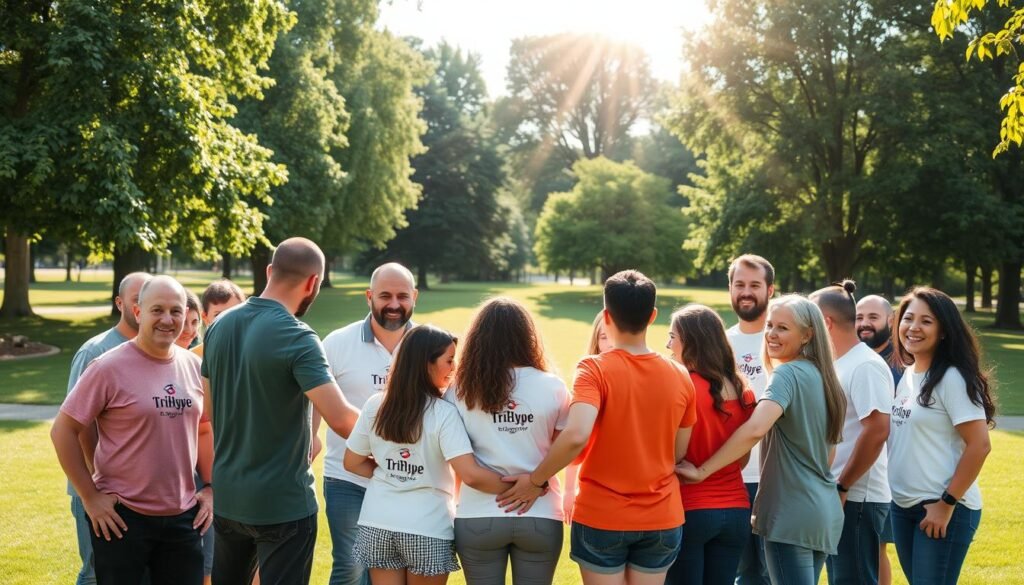on the self improvement Talk “The greatest weapon against stress is our ability to choose one thought over another.” – William James, American philosopher and psychologist.
In today’s fast world, growing personally is key. We all want to reach our best and succeed. This guide will show you how to improve yourself and achieve your goals.
Key Takeaways
- Cultivate a growth mindset to embrace challenges and view them as opportunities for development.
- Develop self-awareness to better understand your strengths, weaknesses, and motivations.
- Set SMART goals that are specific, measurable, achievable, relevant, and time-bound.
- Implement effective time management techniques to boost productivity and eliminate time wasters.
- Build productive habits and a positive environment to support your personal growth journey.
Embracing a Growth Mindset
Adopting a growth mindset is key for self-improvement and personal growth. It means facing challenges, seeing failures as learning chances, and believing abilities can grow with effort. By being positive and overcoming our doubts, we can reach our highest potential and see amazing results.
Cultivating a Positive Attitude
Having a positive attitude is crucial for growing and improving ourselves. When we’re optimistic, we’re more ready to face challenges, grab new chances, and keep going even when things get tough. To stay positive, we can practice gratitude, celebrate our small victories, and surround ourselves with good vibes.
Challenging Limiting Beliefs
Limiting beliefs hold us back from reaching our best. These beliefs are often hidden in our minds, shaped by our past, and stop us from moving forward. By spotting and questioning these beliefs, we can break free and explore new paths. With self-reflection and help from mentors or coaches, we can change our mindset and grow.
“The future belongs to those who believe in the beauty of their dreams.” – Eleanor Roosevelt
By adopting a growth mindset, staying positive, and facing our doubts, we unlock our true potential. This journey of self-improvement and growth is just the start of achieving our dreams and finding happiness.
Developing Self-Awareness
Self-awareness is key to our personal growth. It helps us know our strengths, weaknesses, and what we need to work on. This knowledge empowers us to improve ourselves. Let’s look at ways to boost our self-awareness and reach our full potential.
Regular self-reflection is a great way to grow. Take time each day or week to think about your thoughts, feelings, and actions. Ask yourself, “What are my core values?”, “How do I handle stress?”, and “What makes me angry?” Writing down your thoughts can help you see how you’ve grown over time.
Understanding your personality type is also crucial. Try out tests like the Myers-Briggs Type Indicator or the Enneagram. They can show you your natural ways, how you communicate, and how you make decisions. This knowledge helps you in relationships and making choices that fit your personal development goals.
Getting feedback from people you trust is also helpful. Listen to what they say about your strengths and areas to improve. Use their advice to learn more about yourself.

The path to self-awareness is lifelong, but it’s worth it. Through self-reflection, personality tests, and feedback, we can understand ourselves better. This understanding opens doors to personal growth and happiness.
Setting SMART Goals
Effective self-improvement starts with clear, actionable goals. The SMART framework is key. It means Specific, Measurable, Achievable, Relevant, and Time-Bound. Using these criteria helps us reach our full potential and achieve lasting success.
Specific and Measurable
First, make sure your goals are specific and measurable. Goals should be clear and have clear metrics to track progress. This gives direction and lets us celebrate our achievements.
Achievable and Relevant
Then, make sure your goals are achievable with what you have. They should also fit into your bigger picture of growth and self-improvement. This balance keeps you motivated and focused.
Time-Bound
Lastly, set a deadline for your goals. A deadline adds urgency and accountability. It helps you stay on track and make progress towards your goals.
Using the SMART framework turns dreams into real, achievable goals. These goals drive us towards lasting self-improvement and success.
Mastering Time Management
Effective time management is key to self-improvement and success. By focusing on what’s important and avoiding distractions, we can work smarter. This helps us reach our goals faster.
Prioritizing Tasks
Mastering time management starts with prioritizing tasks. First, make a to-do list. Then, sort tasks by how urgent and important they are. This way, we tackle the most critical tasks first.
- Identify high-impact tasks that directly contribute to our goals.
- Allocate more time and resources to these priority tasks.
- Learn to say no to less important or time-consuming activities that don’t align with our priorities.
Eliminating Time Wasters
Next, we need to cut out time wasters. These can be things like too much social media or checking emails all day. By being mindful of our time, we can use it better.
- Limit distractions by silencing notifications and creating dedicated work zones.
- Batch similar tasks together to improve efficiency.
- Utilize productivity tools and apps to automate repetitive tasks.
By using these strategies, we can improve ourselves, increase our productivity, and reach our goals better. Check out more tips on time management for success.
“Time is the most valuable thing a man can spend.” – Theophrastus

| Prioritizing Tasks | Eliminating Time Wasters |
|---|---|
| Focus on high-impact activities | Limit distractions |
| Allocate more time to priority tasks | Batch similar tasks |
| Learn to say no to less important tasks | Utilize productivity tools |
Building Productive Habits
Habits play a huge role in self-improvement. They are key to growing personally and reaching our goals. We’ll look at ways to build habits that help with self-improvement. This includes daily routines and lifestyle choices that support habit formation and productive habits.
Starting small is a good way to build productive habits. Don’t try to change everything at once. Start with one or two habits you want to add, like exercising daily or journaling. This approach makes it easier to succeed and builds a strong base for lasting change.
Make your new habits easy to do by setting up your environment right. Remove things that get in the way and use cues to remind you. For example, keep a water bottle where you can see it to drink more water.
- Start small and focus on consistency
- Make your desired behaviors easy and accessible
- Celebrate your progress and small wins
- Embrace flexibility and adjust as needed
- Seek support and accountability from others
It’s important to celebrate your small wins. Rewarding yourself for each step helps keep you motivated. Remember, change is a slow process. Be patient and flexible, and don’t hesitate to ask for help.
By using these strategies, you can build the productive habits needed for success. Embrace the power of habit and watch your progress and growth increase.
Practicing Mindfulness
In today’s fast world, it’s easy to feel overwhelmed. But, adding mindfulness to your self-improvement can change your life. It helps you stay present and grow.
Meditation and Breathing Exercises
Meditation and breathing exercises help you relax and focus. They reduce stress and improve your self-awareness. Just a few minutes a day can make a big difference.
- Start with just 5-10 minutes of meditation per day, gradually increasing the duration as you become more comfortable with the practice.
- Try different meditation techniques, such as body scans, mantra repetition, or guided visualizations, to find what works best for you.
- Incorporate breathing exercises like deep belly breathing or alternate nostril breathing to calm your mind and body.
Staying Present and Focused
Mindfulness means living in the now, not the past or future. It boosts productivity and reduces anxiety. It makes life better.
- Actively engage in your daily activities, paying attention to the sights, sounds, and sensations around you.
- When your mind starts to wander, gently bring your attention back to the present moment.
- Practice mindfulness throughout your day, such as during your commute, while eating, or during a conversation.
Adding mindfulness to your life can greatly improve your self-improvement. It helps you stay calm and focused. This mindset benefits all areas of your life.

Cultivating a Positive Environment
Creating a positive environment is key for our self-improvement journey. The places we are in and the people we meet can greatly affect our mindset and well-being. Let’s look at ways to make a positive space that helps us grow.
First, we need to make our physical space better. This means cleaning up, organizing, and adding plants or natural things. A tidy, bright, and comfy area can calm our minds and help us stay focused.
It’s also vital to think about the emotional space we create. Being around positive, supportive people who share our goals is crucial. They offer encouragement, help us stay on track, and inspire us to keep improving. On the other hand, avoiding negative people helps us stay positive and focused.
Doing things we enjoy also helps create a positive environment. This could be anything from creating art to helping others. These activities make us feel good and add to our happiness.
“The environment is everything that isn’t me.” – Albert Einstein
By carefully choosing our surroundings, we can build a supportive space. This space encourages our self-improvement, personal growth, and overall happiness.
Nurturing Personal Growth
Starting a journey of self-improvement is exciting and rewarding. It’s filled with chances for growth and self-discovery. As we aim to be our best selves, it’s key to support this journey and give it the nourishment it needs.
One important part of personal growth is to always be learning. By staying curious and open, we can grow our knowledge and skills. We can do this by reading, taking courses, or finding mentors.
It’s also vital to challenge ourselves often. Stepping out of our comfort zones helps us grow in new ways. Trying new things, taking on projects, or reflecting on ourselves can reveal our hidden potential.
Building a support network is another key part of growth. Being around people who support our values and goals is very helpful. They offer encouragement, help us stay on track, and provide feedback.
The journey to personal growth is ongoing. It’s about discovering, adapting, and changing ourselves. By being open, curious, and committed to our growth, we can achieve more fulfillment and success.
| Strategies for Nurturing Personal Growth | Benefits |
|---|---|
|
|
Remember, self-improvement is a lifelong journey. By nurturing our growth, we can reach our full potential and live the life we dream of.
Embracing Continuous Learning
At the heart of self-improvement is a commitment to learning every day. As we move through life, growing and learning is key. By always learning and improving, we open doors to success and happiness.
Reading and Skill Development
Reading widely, from fiction to non-fiction, broadens our views and sparks curiosity. Whether it’s a new self-help book or a topic that interests us, reading drives our self improvement. Also, spending time on skill development boosts our abilities and brings new chances.
- Invest in online courses, workshops, or certification programs to build expertise in your field of interest.
- Seek out opportunities to learn from industry leaders and subject matter experts.
- Continuously challenge yourself to learn new skills, refine existing ones, and stay ahead of the curve.
Seeking Mentors and Coaches
Another great way to keep learning is to find mentors and coaches. They share their knowledge and guide us. These experts offer valuable advice, feedback, and help us grow in our personal and professional lives.
“The delicate balance of mentoring someone is not creating them in your own image, but giving them the opportunity to create themselves.” – Steven Spielberg
By connecting with mentors and coaches, we speed up our skill development. We also get a new view on challenges, which helps us improve more.
Developing Resilience
Resilience is key to self-improvement. It lets us bounce back from tough times, learn from mistakes, and grow stronger. As we grow personally, we’ll face many challenges. But with resilience, we can turn these obstacles into chances for growth and success.
Persevering Through Challenges
Life is full of challenges, but they don’t have to control us. By being resilient, we can push through tough times. This means staying positive, breaking down big problems, and asking for help when needed. With hard work and determination, we can beat any barrier.
Learning from Setbacks
Setbacks are not failures; they’re chances to learn and get better. When we hit a roadblock, it’s important to think about what we can learn. What did we discover? How can we do better next time? By seeing setbacks as growth opportunities, we can move forward and improve.
“Resilience is not about bouncing back, but about being able to bounce forward and grow through challenges and setbacks.” – Unknown
Building resilience is a powerful step in our self-improvement journey. By facing and learning from obstacles, we grow stronger and more adaptable. Remember, setbacks are just chances to grow, learn, and become our best selves.

Practicing Self-Care
In our journey of self improvement, we must first focus on our personal well-being. Self-care is not just a treat; it’s key to a complete self-care plan. Let’s see how we can add self-care to our daily lives and unlock its power.
Keeping a healthy lifestyle is a big part of self-care. This means eating right, exercising, and sleeping enough. Taking care of our bodies and minds helps us grow and stay strong. Also, taking time to relax and recharge gives us energy and clarity for challenges.
- Try mindfulness, like meditation or deep breathing, to find peace and emotional balance.
- Do things that make you happy, like hobbies, creative activities, or being in nature.
- Reflect on yourself and journal to understand yourself better and manage your feelings.
Remember, self-care is not selfish; it’s a smart investment in our happiness and growth. By putting our well-being first, we face life’s hurdles with strength and achieve real self improvement.
| Self-Care Activity | Benefits |
|---|---|
| Yoga and Meditation | Less stress, clearer mind, and stronger emotions. |
| Journaling | More self-knowledge, better problem-solving, and emotional control. |
| Spending Time in Nature | Better mood, less anxiety, and more calm and connection. |
Building a Support Network
Surrounding yourself with supportive people can really help your [self improvement] journey. Connecting with positive folks and finding [accountability partners] keeps you motivated and on track. It helps you reach your goals.
Surrounding Yourself with Positive People
Being around people who share your values and dreams can change your life. [Positive people] give you encouragement, new ideas, and push you to grow. Make sure to [build a support network] of people who inspire and lift your spirits.
Seeking Accountability Partners
Accountability partners are key to your [self improvement] success. They help you stay focused, celebrate your achievements, and keep you on track when you slip up. By [partnering with someone], you gain the power of shared goals and support. This can be a big game-changer for your personal and professional growth.
Having a [support network] of positive people and accountability partners can really boost your growth and success. [Visit this article](https://medium.com/@nathan.reyna090/how-building-a-support-network-can-help-you-achieve-personal-growth-and-success-34a2eacdfbb7) to see how building meaningful connections can change your life.

| Benefits of Building a Support Network | Characteristics of Positive People |
|---|---|
|
|
“The people you surround yourself with can either raise or lower your standards. Choose wisely.” – Tony Robbins
Celebrating Small Wins
In our journey of self improvement, it’s key to celebrate the small wins. These small steps may seem tiny, but they build the foundation for lasting progress. By celebrating our achievements, we stay motivated and excited for our goals.
Recognizing your small wins is a powerful tool for self-improvement. Every time you beat a challenge, hit a milestone, or make a positive change, celebrate. These small wins show your growth and remind you of your progress.
To effectively celebrate your small wins, try these strategies:
- Create a “progress journal” to document your achievements, no matter how small.
- Share your successes with supportive friends or family members, allowing them to share in your joy.
- Treat yourself to a small reward or indulgence, such as a favorite snack or activity, as a way to mark the occasion.
- Reflect on how far you’ve come and the obstacles you’ve overcome, fostering a sense of pride and accomplishment.
Celebrating small wins is not about seeking external validation or approval; it’s about acknowledging your own hard work and personal growth. By doing so, you’ll cultivate a positive mindset, stay motivated, and continue to make meaningful strides in your self-improvement journey.
“The journey of a thousand miles begins with a single step.” – Lao Tzu
Remember, progress is not always about giant leaps; it’s often the result of a series of small wins that, when combined, can lead to remarkable transformation. Embrace this mindset, and watch as your self-improvement efforts blossom into lasting, meaningful change.
Maintaining a Balanced Life
Improving yourself isn’t just about growing and being productive. It’s also about keeping your life in balance. Finding the right mix between work and personal life is crucial. So is focusing on meaningful relationships for a well-rounded self-improvement journey.
Work-Life Integration
In today’s fast world, it’s easy to let work take over. To live a balanced life, we must blend our work and personal lives smoothly. This means setting limits, learning to share tasks, and choosing how we spend our time wisely.
Prioritizing Relationships
Strong, healthy relationships are key to our happiness and growth. It’s vital to spend quality time with family, friends, and partners. This could be regular date nights, group activities, or just checking in with loved ones.
| Work-Life Integration Strategies | Relationship-Building Strategies |
|---|---|
|
|
By integrating work and life and valuing relationships, we can lead a more balanced and rewarding life. This supports our ongoing self improvement journey.

“The secret of getting ahead is getting started. The secret of getting started is breaking your complex, overwhelming tasks into small, manageable steps, and then starting on the first one.” – Mark Twain
Mastering the Art of Networking at Events
Conclusion
We’ve come a long way on this journey of self-improvement. By using the strategies from this guide, we’ve opened the door to personal growth and success. We’ve learned to grow, be aware of ourselves, set goals, and manage our time well.
We’ve also discovered the value of good habits, mindfulness, and a positive environment. By always looking for ways to learn, we’ve kept our passion for self-improvement alive. With a strong support system and celebrating our small victories, we’ve kept our lives balanced.
Remember, self-improvement is a lifelong journey. By applying what we’ve learned, we can look forward to a brighter future. It won’t always be easy, but with determination and a focus on growth, we can overcome any challenge and achieve great things.
